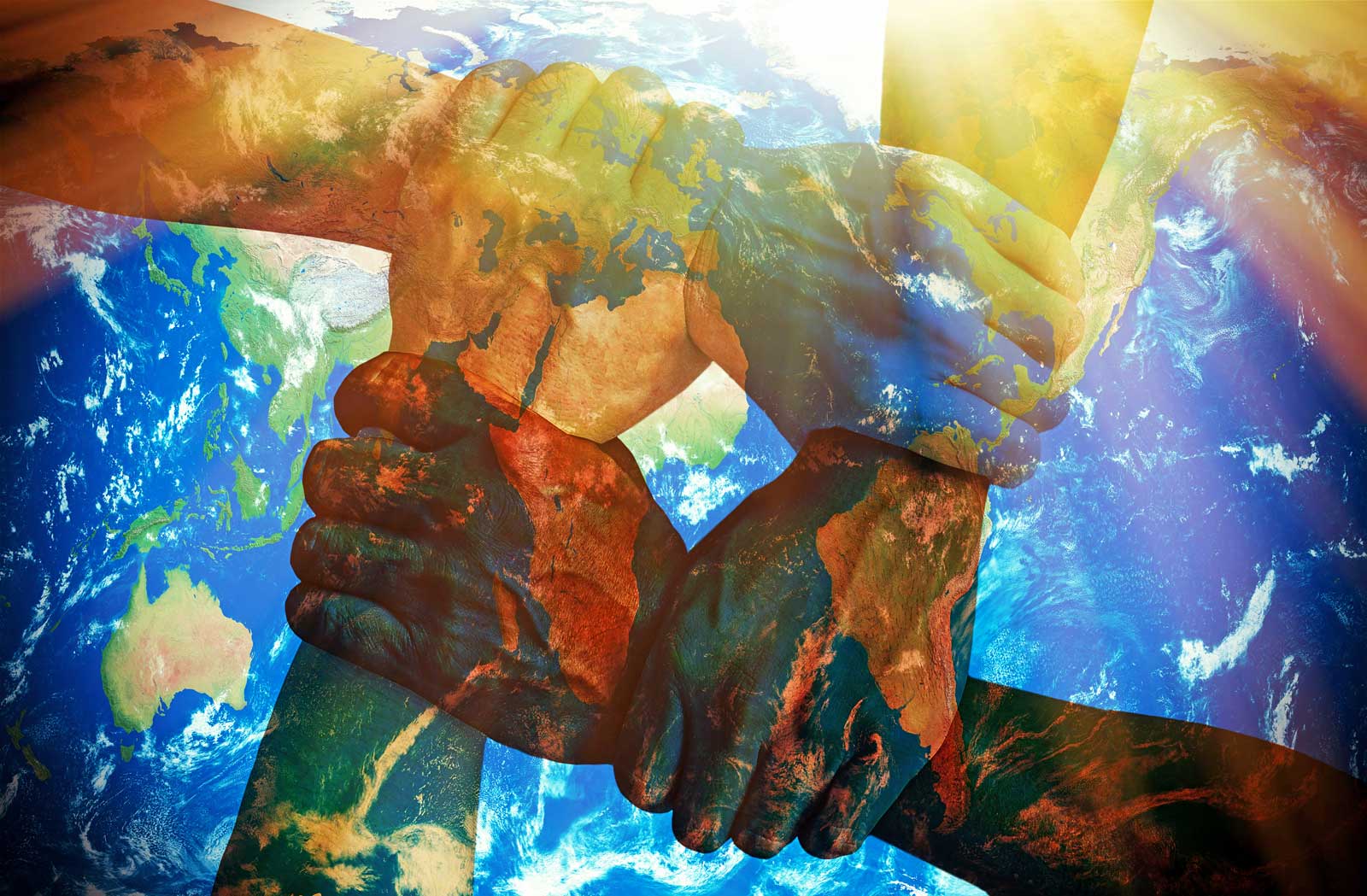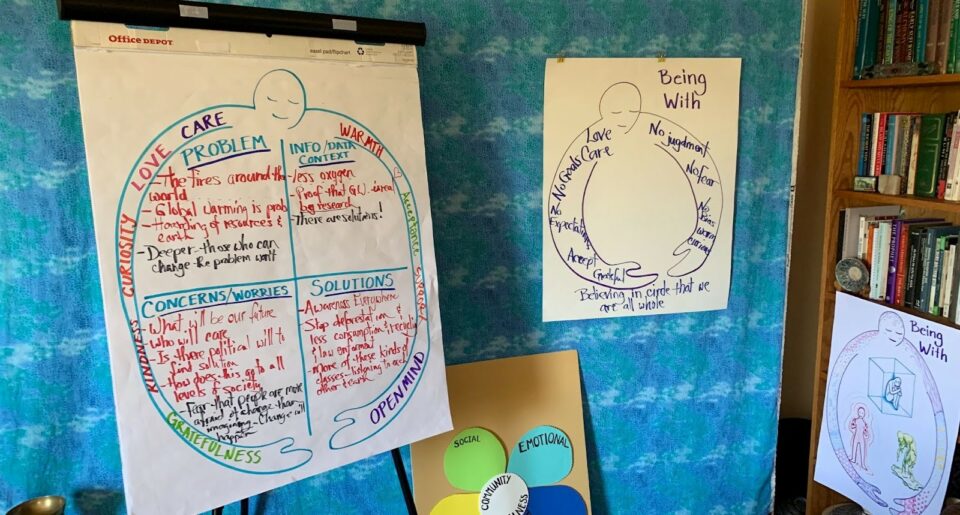

Someone calls us and asks for help with a local community project. Usually this person has worked with us previously or has taken our webinars or participated in one of our psychosocial support classes. The project may be already existing or it may be no more than an idea about how to address a local community problem.
When Turkey was hit by a catastrophic earthquake on February 6th, two professional women in Turkey who had taken Focusing Initiatives International’s Psychological First Aid class from Pat Omidian said to each other, “This is exactly the kind of situation that course was intended for.”
One of the women, Banu, is a psychologist, psychotherapist and a Focuser. She had once called Pat before going to work with survivors of a previous earthquake and asked her, “What do I do?”
Pat had replied, “Don’t try to do anything. You just go in, observe, and start listening to people.”
Banu went to that earthquake zone and spent time listening. And she experienced the power of listening.
So when the earthquake struck Turkey in February, Banu and her friend Yasemin, a sociologist and a graduate student in urban planning, knew they wanted to bring the psychosocial support skills they had learned from Focusing Initiatives to those who were in the midst of the tragedy.
Banu reached out to another friend, Yeşim, who is a psychology professor in Turkey specializing in Disaster Psychology trauma recovery work for first responders in disaster situations. Yeşim was already organizing online workshops to help the rescue and recovery workers deal with the trauma they were experiencing. More than one thousand people attended her webinars.
It was clear more workshops were needed, and Banu called Pat at Focusing Initiatives and said, “I need you to meet Yeşim.”
While Pat and Yeşim had never met before, they had a very similar history and had even worked in some of the same disaster situations – the earthquake in Kashmir and the tsunami in Japan. They felt an instant personal connection and Yeşim invited Pat and Banu to join with her in facilitating future workshops.
And so Focusing Initiatives began collaborating on a series of webinars, providing support to the earthquake workers and survivors in Turkey.
Focusing Initiatives International works to customize its support to fit needs as defined by the local community. We search for and draw on local strengths and resources as each project moves forward.
Banu and Pat put their heads together to custom-design a series of self-care and Focusing trainings that would fit the urgency of the moment and also provide ongoing support while making sure the curriculum and exercises selected were a good fit with the local culture.
Banu wanted to make sure volunteer workers and social workers who worked with the earthquake survivors were included along with the emergency rescue teams. She explained to Pat that there are a few tiers of response in Turkey’s rescue operations:
Coordination of these services can be complicated, especially when they are provided by different government agencies and NGOs, as is the case in Turkey. Clear communication is essential. Yet all three tiers of rescue workers are working with traumatized victims and are being traumatized themselves by the harsh conditions under which they are working, the painful scenes they are witnessing, the heart-rending stories they hear. They need to learn ways to take care of their own mental health in order to communicate clearly and do their jobs well.
They need to learn how to “just observe and listen” without falling apart themselves from the shattering effect of the multiple tragedies that they are attending. And, because many are also coping with their own losses (as local responders), they have to manage their own pain and suffering.
Banu organized translators for Pat. They advertised online workshops using both Banu’s and Yeşim’s extensive contacts in the area. They felt that a thousand participants was too many people to fully benefit from an online training, so they put a cap on sign-ups at 250.
The first class with Focusing Initiatives was scheduled for February 17 and 18 – two hours each day to be team-taught by Yeşim and Pat, followed by more training facilitated by Banu. Over one hundred people attended the first day’s training session, with many new people logging on the second day.
The majority of attendees that first session were from the ‘tier one’ rescue and recovery teams. At least half of them had just recently left the search and rescue area for a brief rest period. Many of the others were still working in the disaster area and calling in from tents where they were housed. And some were people scheduled to relieve the exhausted rescue workers in the next shift.

That session was mostly spent listening to their stories and continued well beyond the allotted time.
We are often told to avoid the recounting of traumatic events for fear of re-traumatizing people, when we want to help them heal. But it is often the case, especially early on, that there is a powerful need to tell the story, to be a witness and testify, and sometimes repeat it many times. To say “this really happened, I was there and saw it, and this is what I experienced”. Each telling needs to be heard. Each telling may be just a little bit different than the one before, to reveal another detail, to discover a new meaning.
So, early in the first day, Yeşim described an experience she had had in a disaster situation, and Pat said, “Oh yes, Yeşim, when you said this, it took me straight back to my situation in Japan after the tsunami. It was so hard!” So Pat was reflecting and validating Yeşim’s experience in front of a hundred people. And that normalized the participants’ own reactions to the stress and distress of their experiences. If these two experts had suffered the way they were suffering and admitted that they had had trouble dealing with their emotions, this seemed to give the participants permission to share their own feelings. One man – a therapist – shared that 16 of his patients had been killed in the earthquake. Another spoke about seeing a doll lying in the dust of a collapsed building and suddenly fighting back tears.
They went into breakout rooms and listened to each others’ stories. They talked about the mothers wandering past the rubble calling their children’s names; about a father digging through the remains of his neighbor’s house just hours after learning his own child had perished; about hearing cries for help and being unable to find an old man trapped in the debris in time to save him. They talked about the joy and relief they felt for each life saved, the sorrow for lives lost, and then, either way, turning back to look for the next one, and the next. They talked about going home and finding their house gone and not knowing where to look for their family.
They talked about exhaustion and determination and hope and frustration.
We keep on listening and learning as we work in a community. We make adjustments as needed. Our work is always a team effort. We value local expertise and come with the expectation that we will learn more from the local people than we will teach them. Our goal is always to strengthen and develop local community efforts, to promote that which empowers people and builds local support so that the community can thrive going forward without our direct involvement.
Pat’s planned two-hour session lasted four hours. And that pattern followed throughout, with each training extending its hours in response to participants’ requests.
The second day of that first session, they began to discuss self care. People shared through the chat room, writing what they did to find a moment of healing in the midst of all the destruction and loss.
Some of their answers: petting a cat, spending time with my family, hugging my mother, watching the sea, doing handcrafts, being alone and crying as loud as possible in a place where no one else is there to hear me, brushing my teeth, taking long walks, following the news because the feeling of knowing what’s going on gives me comfort.
Pat was involved in four training sessions, with Banu playing a larger role in each one as the trainings emphasized skills in listening and basic Focusing. And as the bulk of the work has moved through the second and third tiers, so have the workshop attendees shifted from primarily first tier responders to inclusion of more and more members of the medical teams and the social workers providing basic needs.
These trainings formed part of the base for Yesim’s future work forming the Afet Psikolojisi Platformu with Banu supporting her, as well as Banu’s work directly in the field supporting residents in tent cities and still continuing.
Keeping listening as the basis… Banu says it was amazing to see how far listening without trying to console or immediately problem-solve can go a long way in supporting people who have gone through the disaster of the century. While the wounds are still open the work continues on through the people it has touched having nurtured local capabilities and consciousness.
We asked participants to give us feedback so that we can learn what works well, what needs to be improved, and what needs to happen next.
A few people felt they were too busy, too overwhelmed with immediate tasks in this crisis, to bother with self-care, but many more felt nourished and re-energized – more ready to take on the weight of their work.
Many felt that the sharing had been especially helpful, as expressed in comments like these:
People also found the sharing brought new insights:
Asked what they needed next, several people came up with comments and ideas that could lead the project forward to new areas:
All the people participating are wonderıng about carryıng this learning to future expected earthquakes in various parts of Turkey including Northwest Turkey and Istanbul, as well as other future disasters, such as forest fires and floods as climate change has brought to the fore. There are fault lines throughout the country so that shifts in one area can activate quakes in adjacent regions, not just as aftershocks, but as major events in themselves. (The fourth session occurred just hours after a new quake had hit the region toppling seven buildings.)
One person specifically asked for ongoing workshops with readiness preparation in mind: “I personally would love to have more specific trainings in the field of psychology for those who are planning to work with the earthquake survivors in the near future. I would also like to voluntarily participate and hope we will stay in touch.”
Another suggested trainings designed for different needs: “There could be two separate modules in the training going forward, for those who continue to stay in the field and those who return, addressing how to continue your work when you return, the relationships you have with people, relatives and colleagues… about the floundering there.”
We keep on listening. If more help is needed, we will continue to support the effort. When the community feels ready, we are happy for it to carry on without us. And we invite them to call on us again if they need us.
Copyright © 2024 - Focusing Initiatives International, All Right Reserved. - Privacy Policy, how we process your personal data.